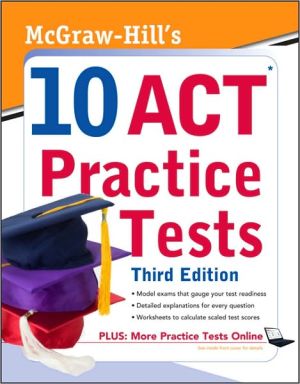Act
CliffsQuickReview course guides cover the essentials of your toughest classes. Get a firm grip on core concepts and key material, and test your newfound knowledge with review questions.\ When you need a logical, easy-to-grasp guide to prepare for your important college-entrance exam, CliffsQuickReview ACT can help. This guide shows you exactly what to expect from the exam with explanations of every question type, tested and proven strategies, and a practice exam complete with explanations for...
Search in google:
CliffsQuickReview course guides cover the essentials of your toughest classes. Get a firm grip on core concepts and key material, and test your newfound knowledge with review questions. When you need a logical, easy-to-grasp guide to prepare for your important college-entrance exam, CliffsQuickReview ACT can help. This guide shows you exactly what to expect from the exam with explanations of every question type, tested and proven strategies, and a practice exam complete with explanations for every answer. CliffsQuickReview ACT gives you access to the experience and insights of leading experts in the field of test preparation. Take advantage of their expertise by following this six-step approach:Be aware. Know as much as you possibly can about the exam before you walk in. This CliffsQuickReview gives you this important information in a clear and easy-to-understand way.Set a goal. Call some of the schools you're interested in and see what score you need to be accepted there. This guide includes charts to help you set your goal.Know the basic skills. This CliffsQuickReview will help you focus on which skills to review and will help you review those skills with practice questions and easy-to-follow, complete explanations.Understand the question types. This CliffsQuickReview carefully analyzes each type of question so that you'll understand how to focus on what is being asked.Learn strategies. This guide emphasizes strategies and techniques for answering each type of question and includes samples that show you what to look for and how to apply each strategy.Practice. This CliffsQuickReview includes a pracice exam with answers, complete explanations, and analysis charts to help you spot your strengths and weaknesses. With titles available for all the most popular high school and college courses, CliffsQuickReview guides are a comprehensive resource that can help you get the best possible grades.
IntroductionThe Common Format of the Act3Questions Commonly Asked About the Act7Taking the Act Assessment11Key Strategies for a Positive Approach to the Exam11Set a goal11Review basic skills necessary13Know the directions14Look for winners14Don't get stuck14Eliminate16If you don't know the answer, guess16Don't misread17Use a multiple-multiple-choice technique18Practice, practice, practice19Erase extra marks on your answer sheet19The Basics, the Questions, and the Key Strategies for the Act Test SectionsThe Basics of the English Test23The Skills You'll Use23Your English Test Score23The Directions23The English Test Questions and Key Strategies25The Types of English Test Questions25General Strategies for Any English Test Question26The Types of Usage and Mechanics Questions27Samples and Key Strategies for the Usage and Mechanics Questions28Know the common punctuation errors29Understand standard grammar and usage31Note the sentence structure32The Types of Rhetorical Skills Questions34Samples and Key Strategies for the Rhetorical Skills Questions35Pay special attention to the relationship of language to audience, strategy, and purpose35Notice how well the paragraph or essay is organized37Watch for precise, appropriate use of language40The Basics of the Mathematics Test43The Skills You'll Use43Your Mathematics Test Score43The Level of Difficulty44Using Your Calculator44The Directions46The Mathematics Test Questions and Key Strategies47The Types of Mathematics Questions47Samples and Key Strategies for the Mathematics Questions48Underline or circle what you're looking for49Simplify the problem50Work forward51Work backward, from the answers52Plug in simple numbers53Pull out information54Mark in, or fill in, the diagram56If no diagram is given, draw one57Use 10 or 10058Approximate59Glance at the choices on procedure problems60Be reasonable61The Basics of the Reading Test63The Skills You'll Use63Your Reading Test Score63The Directions64The Reading Test Passages, Questions, and Key Strategies65The Types of Reading Passages65The Types of Reading Questions66Sample Passages, Questions, and Key Strategies for the Reading Questions67Read the passage actively67Preread a few questions70Read the passage looking for its main point and structure74Make sure that your answer is supported by the passage75Note the purpose or tone76Make sure that the answer you select "answers the question"77Take advantage of the line numbers78Read all the choices79Use an elimination strategy80Three Final Strategies81Skip a difficult passage81Skim the passage81Potshot questions81The Basics of the Science Reasoning Test83The Skills You'll Use83Your Science Reasoning Test Score83The Directions83The Science Reasoning Test Passages, Questions, and Key Strategies85The Types of Science Reasoning Passages85The Science Categories86General Strategies for Any Science Reasoning Test Question87Sample Passages, Questions, and Key Strategies for Data Representation Questions88Focus on understanding what information is given90Don't memorize the information91Perform basic calculations92Reason from the information given93Look for obvious large changes94Work with the information given94Draw conclusions, form hypotheses, and make predictions95Sample Passages, Questions, and Key Strategies for Research Summary Questions96Focus on the purpose of the study or experiment(s), their differences, similarities, and outcomes99Consider possible hypotheses or generalizations100Watch for the methods used and the design101Notice what may be suggested by the evidence or outcome102Understand how the data are displayed103Reason from the information and draw conclusions104Sample Passages, Questions, and Key Strategies for Conflicting Viewpoints Questions105Understand the topic and basic premise of each viewpoint107Identify the reasoning involved108Be aware of what might strengthen or weaken a viewpoint109Analyze the specifics of each viewpoint and the argument supporting it110Mark the differences and similarities111Look for what might be suggested or implied by an argument111Reason from new information112Practice TestAnswer Sheet for the Practice Test115English Test119Mathematics Test155Reading Test181Science Reasoning Test203

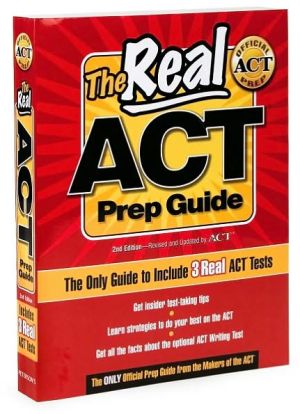
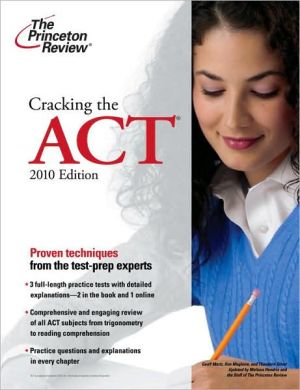
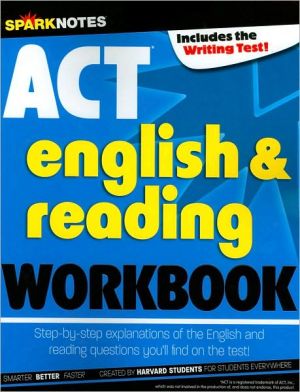
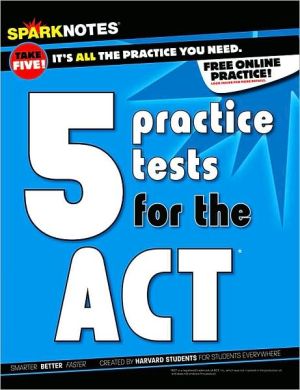
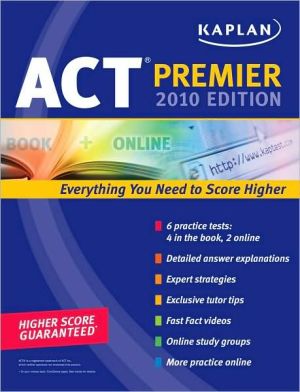
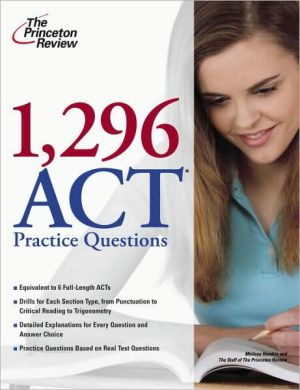
![The Real ACT Prep Guide [With CDROM] The Real ACT Prep Guide [With CDROM]](/application/data/covers/14/02/9780768931402.jpg)
